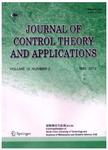Stable adaptive fuzzy control of nonlinear systems using small-gain theorem and LMI approach
Stable adaptive fuzzy control of nonlinear systems using small-gain theorem and LMI approach作者机构:School of Mathematics Yancheng Teachers University Yancheng Jiangsu 224051 China School of Information Science and Technology Yancheng Teachers University Yancheng Jiangsu 224002 China
出 版 物:《控制理论与应用(英文版)》 (JOURNAL OF CONTROL THEORY AND APPLICATIONS)
年 卷 期:2010年第8卷第4期
页 面:527-532页
核心收录:
学科分类:0711[理学-系统科学] 07[理学] 08[工学] 0835[工学-软件工程] 0802[工学-机械工程] 081101[工学-控制理论与控制工程] 0811[工学-控制科学与工程] 080201[工学-机械制造及其自动化] 071102[理学-系统分析与集成] 081103[工学-系统工程]
基 金:supported by the Natural Science Foundation of the Jiangsu Higher Education Institutions of China(No.07KJB510125,08KJD510008) the Natural Science Foundation of Yancheng Teachers University(No.07YCKL062,08YCKL053)
主 题:Nonlinear control Fuzzy control Adaptive control Small-gain theorem Input-to-state stability
摘 要:A new design scheme of stable adaptive fuzzy control for a class of nonlinear systems is proposed in this *** T-S fuzzy model is employed to represent the ***,the concept of the so-called parallel distributed compensation (PDC) and linear matrix inequality (LMI) approach are employed to design the state feedback controller without considering the error caused by fuzzy *** conditions with respect to decay rate α are derived in the sense of Lyapunov asymptotic ***,the error caused by fuzzy modeling is considered and the input-to-state stable (ISS) method is used to design the adaptive compensation term to reduce the effect of the modeling *** the small-gain theorem,the resulting closed-loop system is proved to be input-to-state *** analysis verifies that the state converges to zero and all signals of the closed-loop systems are *** effectiveness of the proposed controller design methodology is demonstrated through numerical simulation on the chaotic Henon system.



